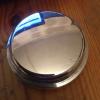Correct, Once the bolt enters the plastic region of failure the force required to further deform it becomes less and less until the bolt fails, this is due to micro fractures inside the molecular structure of the material forming thus reducing the cross sectional area avalible to distriubte the load or force increasing the stress on the atoms still grabbing together thus accelerating failure. Now bear in mind that this explanation is simplified to give you an explanation of the primary component of failure in this case a bolt and an understanding of what is happening to the material itself.
In regards to the transfer of load, and how abrupt it is, this is way more complicated, especially with your climbing ropes as these are elastic materials (polymers) not ordered crystiline solids like metals, for for the easy idea...force is force and when coupled under a torqued preload for the cap and block and bolt....there is no real transfer, there is either load present or no load, unless we start treating this system like real life and model it as dynamic with respect to time, crank rotation, moments, impulse and the like (up until this point we have been looking in more or less static fashion to simplify things) this begins to bring in calculus and differential equations making thing very complicated. The best way to look at it is that there is load and stress present under operating conditions....we use the max value we may encounter as a limiting factor and add a little on top for saftey reasons, to determine if failure will occur, we see if the stress in any of the individual components exceeds the yield value of that given material, if it does we have a problem....
Now a very important thing to bear in mind, it this is true in a perfect world under room temp cond...we have not even considered the thermal effects associated with the engine (ie expansion and thermal stress) or the idea of stress concentrations. The original designers of the A-series engine would have taken these into account so as a general guidline use at least that spec of bolt, uprating will only improve the ability of the bolt to withstand damage and more load....until someone starts casting new blocks.....

...oh, and just so you are aware though way beyond the scope of this conversation, and before you ask, when I refer to stress concentrations, This means that nicks, scratches, and holes all reduce the maximum yield value a material has....so when you go to start drilling holes to lighten things up a bit, the stress around that area will be 3 times greater under load....just something to consider on load bearing objects


















